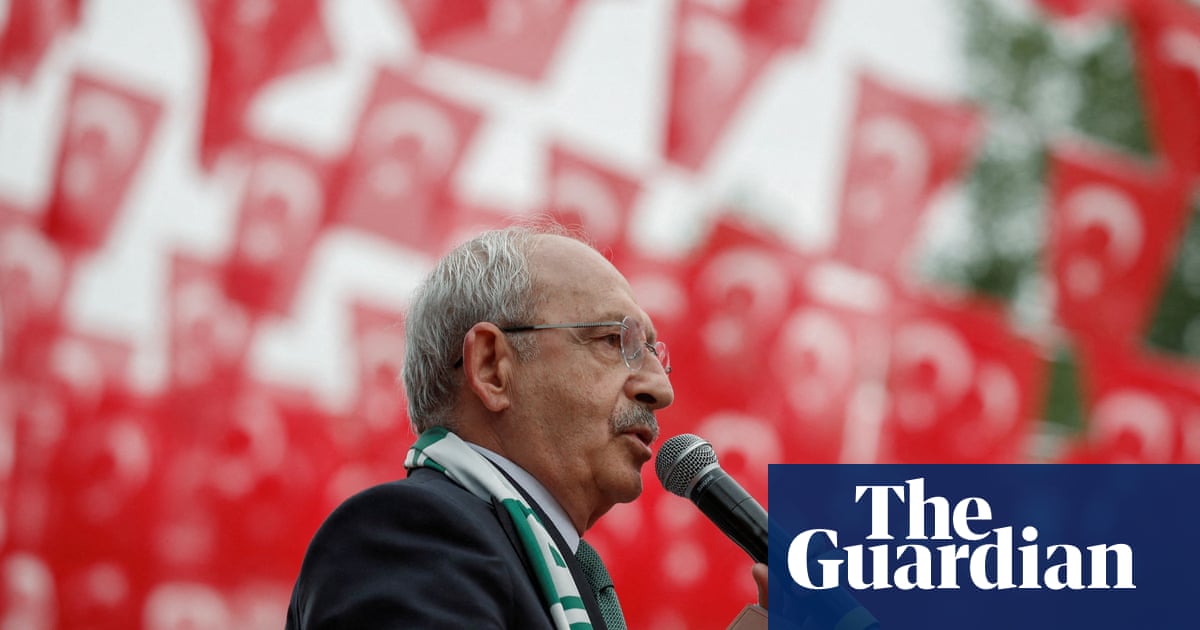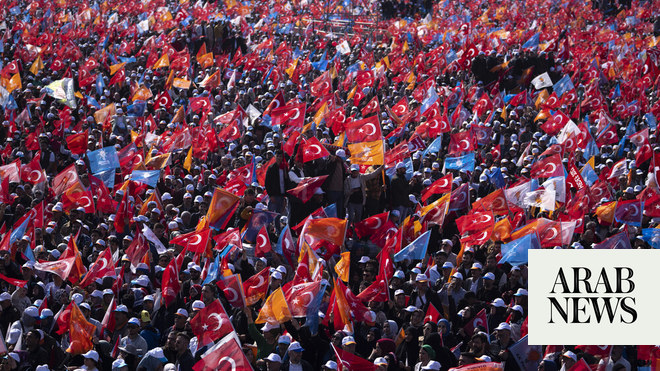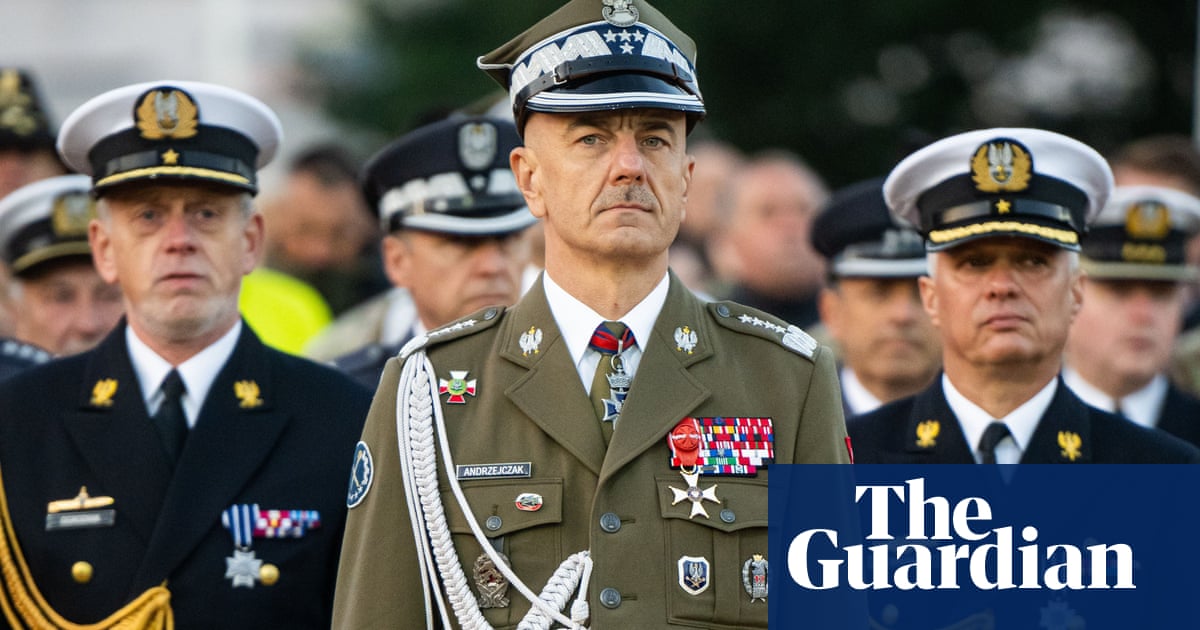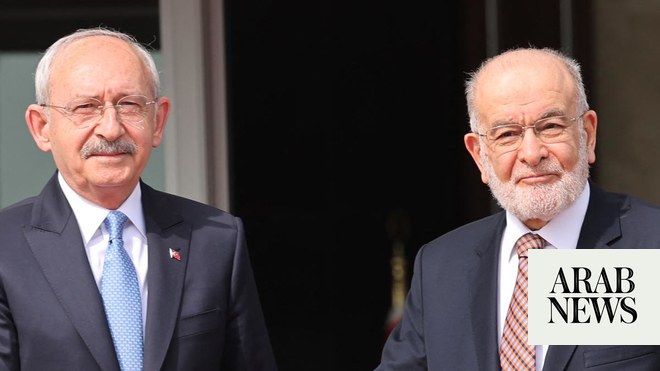
Turkey’s leading opposition candidate has accused Russia of election interference days before the country’s most consequential vote in a generation.
Kemal Kılıçdaroğlu of the Republican People’s party (CHP), the chief rival to the incumbent president, Recep Tayyip Erdoğan, accused Russia of concocting deepfake videos and false material, seemingly a reference to an allegedly fake sex tape of candidate Muharrem İnce, released a day before he dropped out of the race.
“If you want the continuation of our friendship after 15 May, get your hands off the Turkish state,” said Kılıçdaroğlu, adding: “We are still in favour of cooperation and friendship.”
Kremlin spokesperson Dmitry Peskov rejected claims of election interference. “We officially declare: there can be no talk of any interference,” he said. “If someone provided Mr Kılıçdaroğlu with such information, they are liars.”
Turkish voters will go to the polls on 14 May to cast their ballots for both the president and parliament. Re-electing Erdoğan would provide a mandate for him to further concentrate power around his office, crack down on opponents, and use his position of influence on the world stage to harden his control at home.
Current polling suggests a tight vote in the presidential election, where one candidate must secure more than 50% to win outright, or the race will go to a runoff two weeks later.
Erdoğan, who previously lashed out at the US ambassador Jeff Flake for publicly meeting with Kılıçdaroğlu, has declared that “Turkey will give a message to the west with this election.” His interior minister, Süleyman Soylu, went even further, describing the vote on 14 May as “a political coup attempt by the west”.
The six-party opposition coalition led by Kılıçdaroğlu has campaigned on the promise of reform, and the dismantling of a sprawling system of control that Erdoğan has spent two decades building. Under Erdoğan’s leadership, Turkey transformed into a presidential system supported by a vast patronage network loyal to his Justice and Development party (AKP), rebuffing an attempted military coup in 2016 and often branding his opponents enemies of the state. Erdoğan has also increased Turkey’s footprint overseas and reshaped its economy in his image, overseeing vast infrastructure projects and development but also an economic crisis in which the Turkish lira has halved in value in the past year alone.
“As we get closer to the vote, I feel excited but also responsible for the fate of 85 million people across Turkey,” said Canan Kaftancıoğlu, a leading member of the CHP, currently weathering a ban from politics after a court charged her with insulting Erdoğan. Despite the ban, Kaftancıoğlu has continued to work, aiding Kılıçdaroğlu in his fight for the presidency by overseeing efforts to ensure a fair election.
“I believe this election will set an example, not just for Turkey but for the whole world. For the first time, an authoritarian regime will be taken out by democracy,” she said. “If we succeed, it will set an example for other countries struggling for their own democracies.”
The possibility of a one-round race with potentially a victor as early as Sunday increased slightly after İnce dropped out, leaving only the small margin of votes held by the ultranationalist Sinan Oğan of the Victory party to spoil the chances of either candidate reaching the threshold for a runoff.
In the parliamentary elections, polls also suggest Erdoğan’s coalition could lose its governing majority, but the opposition must win a majority in parliament and the presidency to ensure they achieve their primary aim of returning Turkey to parliamentary democracy.
“We do not trust the supreme election council, but we took every precaution,” Kılıçdaroğlu said during a recent interview, describing how the CHP and their partners in opposition assign poll watchers to every ballot box, and will conduct a parallel count on election day to ensure a fair vote. “Despite it all, we will win,” he said.
For the opposition, their continued survival as well as democracy itself are on the ballot; Erdoğan’s coalition partner, Devlet Bahçeli, recently declared the opposition could receive “life sentences or bullets in their bodies”. The campaign trail has been pockmarked with violence towards opposition figures with a bullet being thrown inside the CHP’s local offices in one town, a day after a group threw stones at supporters and the campaign bus of the leading opposition figure and Istanbul mayor Ekrem İmamoğlu.
“This is the election that determines whether Erdoğan is considered an elected president with autocratic tendencies who then lost and left power, where the story is one of the resilience of Turkish democracy. Or, is it an election in which after everything he’s done, with Osman Kavala[a philanthropist] in prison, with Selahattin Demirtaş [a Kurdish political leader] in prison, with dozens of journalists arrested, where Erdoğan wins again and comes back to do this for another five years,” said Nate Schenkkan of Freedom House.
The vote for president is expected to be close, where even a difference of a few percentage points could affect which candidate can claim the vote was fair and provides a clear mandate or whether it goes to a runoff two weeks later. This outcome is expected to depend in part on Kurdish voters, including the sizeable portion now backing Kılıçdaroğlu after the largely Kurdish leftwing Peoples’ Democratic party opted not to field a presidential candidate, and its jailed leader Demirtaş backed Kılıçdaroğlu.
The result will also hinge heavily on votes cast within the 11 Turkish provinces deeply affected by twin powerful earthquakes that killed more than 50,000 people, levelled infrastructure and displaced millions.
The government resisted efforts to allow those registered to vote within the earthquake zone to vote elsewhere, forcing those wishing to cast their ballots to return to areas destroyed by the earthquake on election day.
“This is a big problem, and we honestly have no idea what will happen,” said Nuran Yilmaz, deputy head of the CHP in the coastal town of Antalya whose family in the southernmost province of Hatay was displaced by the earthquake and will be forced to return there to vote. “Our party is working on it, but we will be forced to pay to travel to Hatay. My entire family, my sister and my brother will go to Hatay and pay their own way, just to vote.”
Amid concerns about the fairness of the upcoming vote, Schenkkan said this was distinct from whether the election should be considered free. “I think fairness is not up for debate any more, given Erdoğan’s disproportionate use of state media, his control of mainstream broadcast and print media, the censorship of social media, the imprisonment of Demirtaş, there’s a whole slew of ways in which this election is not fair,” he said.
“But freeness is debatable, for one it’s not really free as the HDP is not really free to compete, there’s imprisonment of its most prominent leaders and many of its members and the overall atmosphere of retribution against that party affects the freedom of choice most voters have. Freedom at the ballot box is governed by the election authority, so the voting could be run freely but they could still change the rules at the end.”












